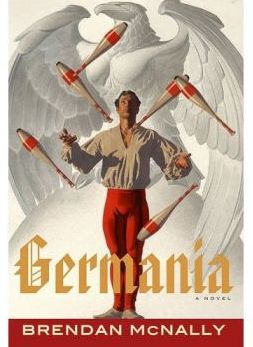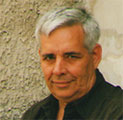Review: Germania by Brendan McNally
 What is it with North Texas novelists making their debuts with really oddball thrillers?
What is it with North Texas novelists making their debuts with really oddball thrillers?
Four years ago, Will Clarke appeared with Lord Vishnu's Love Handles. The novel combines terrorism, Dallas social satire and a Hindu apocalypse. It doesn't always work, but Lord Vishnu surely ranks as one of the stranger, more amusing entertainments by a local writer.
Now comes Brendan McNally (below) with his first novel, Germania. Germania was Adolf Hitler's name for his future world capital in Berlin. It's a terrifically ironic title because McNally's novel is about a German reich very few have ever heard of. Most histories of Nazi Germany end with the complete flameout of the final days in Berlin. They rarely handle what happened next.
A caretaker government was formed in a town called Flensburg. Its basic purpose was to hold on long enough to surrender to somebody. Instead of Hitler's Thousand-Year Reich, Flensburg was the three-week Reich.
So far, so fascinating.
Writers such as Alan Furst and Philip Kerr have uncovered these kinds of nuggets to craft superb thrillers about World War II. McNally is a former defense journalist, so the military history is a natural for him.
Flensburg also provides a remarkable cast of desperate, real-life characters. Several scrambled to escape arrest for their war crimes. But simultaneously -- even bizarrely -- they also hoped to be proclaimed supreme leader of post-war Europe. One of these would-be leaders was Albert Speer, Hitler's architect and armaments expert. Another was Heinrich Himmler.
That's right. The head of the SS actually believed the Allies wanted him to run Europe. Of course, Himmler was also daffy enough to use his massage therapist to try to arrange a peace treaty with Sweden.
All of this is completely true. But as dangerous and farcical as the Flensburg period was, McNally chooses to tell the story by inventing a vaudeville troupe of comic juggler-singer-gymnasts.
The Flying Magical Loerber Brothers. Before the war, they were beloved entertainers. But they're secretly Jewish. And they disappoint their fans by mysteriously disappearing. It's only in these last weeks as Germany falls into chaos that the four Loerbers pop back up in very different roles.
This is author Brendan McNally reading an excerpt from Germania:
 MCNALLY: "Speer tried to remember what he could about the Flying Magical Loerber Brothers. Like everyone else, he'd seen them perform many times. Still, Speer had been largely bewildered by the Loerber brothers mania. He remembered all the photo and variety magazine covers. Some trademarked picture of their four identical faces arranged like a crescent moon. Which one is your favorite, it always asked. Which to Speer didn't make any sense because they were all indistinguishable from each other. It was like having a favorite corner of a square building."
MCNALLY: "Speer tried to remember what he could about the Flying Magical Loerber Brothers. Like everyone else, he'd seen them perform many times. Still, Speer had been largely bewildered by the Loerber brothers mania. He remembered all the photo and variety magazine covers. Some trademarked picture of their four identical faces arranged like a crescent moon. Which one is your favorite, it always asked. Which to Speer didn't make any sense because they were all indistinguishable from each other. It was like having a favorite corner of a square building."
The Loerber brothers are a quirky, sometimes jarring device for telling the Flensburg story. But they do lead to some marvelous, fictional moments - like when one Loerber teaches Albert Speer how to juggle.
It's when McNally throws in psychic powers that things get out of hand. And get unnecessary. As I said, the Flensburg story is woolly enough as it is. No need for Germania to fall off the trapeze and land in the world of Marvel Comics.
But I confess that Germania - like Will Clarke's Lord Vishnu - can hold your interest.The tonal shifts are distracting, but the books are highly readable. I read them to the end wondering -- what's coming next?
Both Will Clarke and Brendan McNally wrote these thrillers while hanging out in local Starbucks. So perhaps there's something in the coffee they serve around here.
An audio version of this review can be found with the review on Artandseek.org
Categories:
Blogroll
Critical Mass (National Book Critics Circle blog)
Acephalous
Again With the Comics
Bookbitch
Bookdwarf
Bookforum
BookFox
Booklust
Bookninja
Books, Inq.
Bookslut
Booktrade
Book World
Brit Lit Blogs
Buzz, Balls & Hype
Conversational Reading
Critical Compendium
Crooked Timber
The Elegant Variation
Flyover
GalleyCat
Grumpy Old Bookman
Hermenautic Circle
The High Hat
Intellectual Affairs
Jon Swift
Laila Lalami
Lenin's Tomb
Light Reading
The Litblog Co-op
The Literary Saloon
LitMinds
MetaxuCafe
The Millions
Old Hag
The Phil Nugent Experience
Pinakothek
Powell's
Publishing Insider
The Quarterly Conversation
Quick Study (Scott McLemee)
Reading
Experience
Sentences
The Valve
Thrillers:
Confessions of an Idiosyncratic Mind
Crime Fiction Dossier
Detectives Beyond Borders
Mystery Ink
The Rap Sheet
Print Media:
Boston Globe Books
Chicago Tribune Books
The Chronicle Review
The Dallas Morning News
The Literary Review/UK
London Review of Books
Times Literary Supplement
San Francisco Chronicle Books
Voice Literary Supplement
Washington Post Book World
